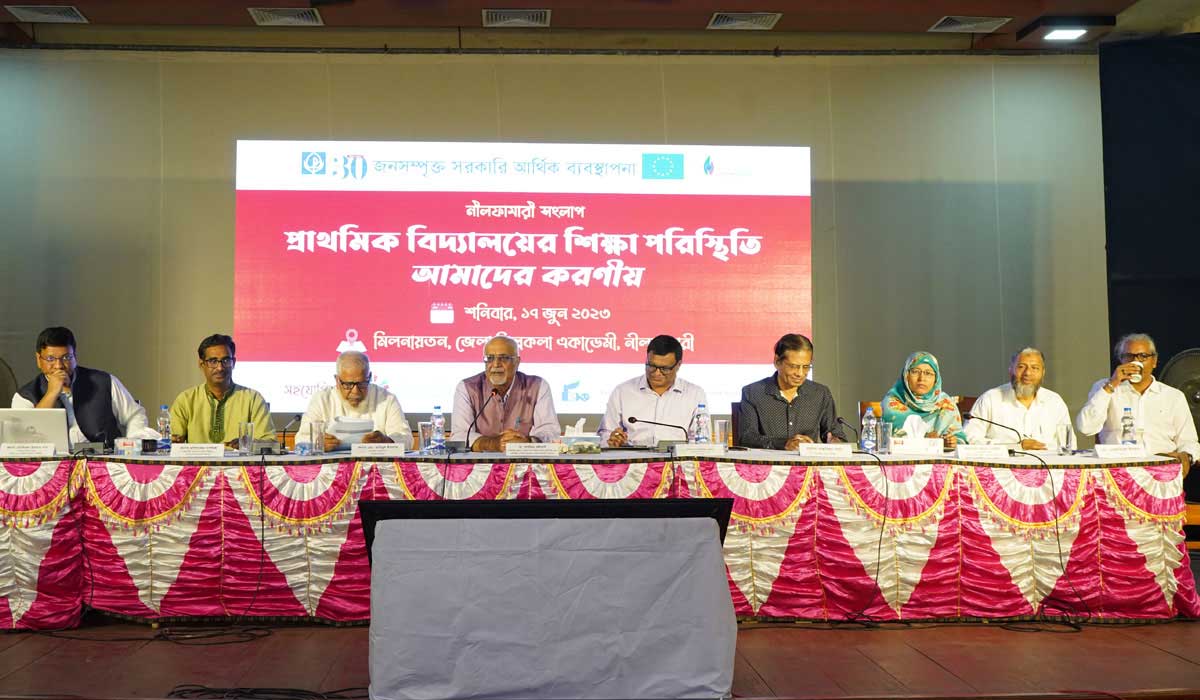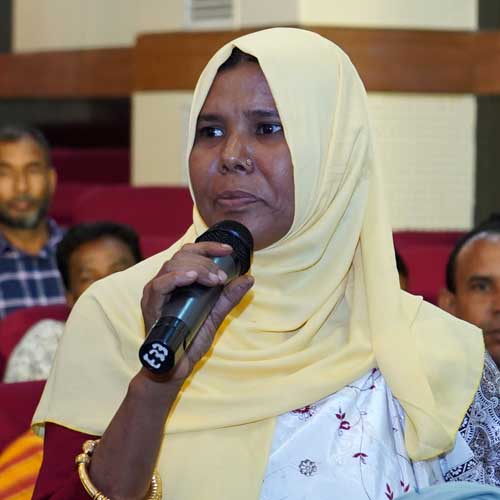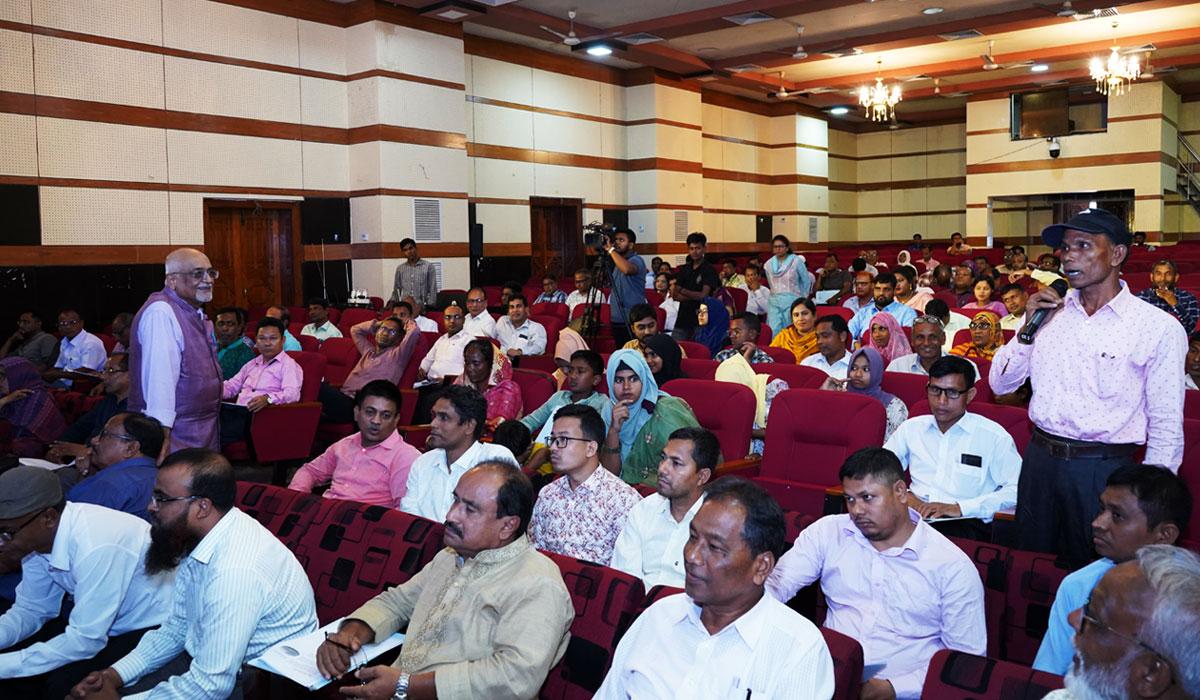
The prominence of good governance and public participation in the public finance management has increased remarkably as Bangladesh is advancing towards developments at a faster pace in terms of all required indicators of the development domain. However, a concern still prevails that the development speed and quality will be less sustainable if there is no right financial management to maintain the overall progress. And the primary and mass education programmes at the local level hold a significant position as a priority sector when it comes about the public expenditure. Aligned with its research goals, the Centre for Policy Dialogue (CPD) has conducted social audits in recent past in Nilphamari (Dimla Upazila) district. The aim of the audit was to gather an accurate and reliable estimate of the needs of the citizens at the grassroots level regarding primary education in terms of quality of education, provision of infrastructure, inclusiveness of education system and management, and identification of challenges and development opportunities. The social audit encompassed the active participation of local administrative officials, civil society members, representatives of different communities and other stakeholders, aiming to gather valuable insights and perspectives regarding primary education at local levels.
To show the social audit outcomes and explore the views of the local representatives, a sub-national dialogue titled ‘Education Scenario in Primary Schools: Measures that need to be taken’ was held on Saturday, 17 June 2023 at District Shilpakala Academy Auditorium, Nilphamari. The dialogue was initiated by CPD, with support from the European Union, in partnership with Eco-Social Development Organization (ESDO) and in collaboration with Citizen’s Platform for SDGs, Bangladesh.
 Dr Debapriya Bhattacharya, Convenor, Citizen’s Platform and Distinguished Fellow, CPD, moderated the dialogue. He said, ‘Recently, Bangladesh had experienced a remarkable surge in development, including in the fields of education and healthcare. Various significant advancements have been witnessed, reflecting the nation’s growing momentum’. However, the needs of Bangladesh are so extensive that regardless of the substantial progress achieved, it remains challenging to fully address them, said Mr Bhattacharya. To him, the significance of quality education cannot be overstated when striving to implement a global agenda. It is widely acknowledged that without a strong foundation in primary education, the ability to succeed in secondary, higher-secondary, and university levels becomes increasingly difficult, he opined.
Dr Debapriya Bhattacharya, Convenor, Citizen’s Platform and Distinguished Fellow, CPD, moderated the dialogue. He said, ‘Recently, Bangladesh had experienced a remarkable surge in development, including in the fields of education and healthcare. Various significant advancements have been witnessed, reflecting the nation’s growing momentum’. However, the needs of Bangladesh are so extensive that regardless of the substantial progress achieved, it remains challenging to fully address them, said Mr Bhattacharya. To him, the significance of quality education cannot be overstated when striving to implement a global agenda. It is widely acknowledged that without a strong foundation in primary education, the ability to succeed in secondary, higher-secondary, and university levels becomes increasingly difficult, he opined.
Mr Akhteruzzaman, Member, General Committee, ESDO, in his introductory remarks, said the prevailing attitude of striving for a GPA 5 is creating a significant demand for private tutoring among students and parents. He also emphasised on inclusion of moral education in the national primary education curriculum.
Mr Towfiqul Islam Khan, Senior Research Fellow, CPD, delivered the keynote presentation. He highlighted that in Nilphamari, the primary school enrolment rate is more than the national average, and it indicates a positive progress. He, however, explained the concern that the primary school dropout rate in the district exceeds the national rate. Furthermore, concerning internet usage, the district is lagging as the rate is approximately 21 per cent lower than that of the national average mark. Dimla Upazila, situated in the Char region, faces significant challenges, including a high poverty rate and inadequate communication systems in several areas. As a result, numerous families find themselves compelled to rely on their children’s income-generating work instead of prioritising their education by sending them to school or other types of educational institutions. At the same time, the substandard quality of education in government primary schools further exacerbates the issue, leading to cases where affluent families opt not to enrol their children in public schools.
He recommended increasing the number of classrooms in the primary schools, teacher recruitment and trainings. He also urged providing adequate resources for extracurricular activities, ensure digital learning materials for all the classrooms, construction of boundary walls and separate toilets in every primary school for girls and boys. He finally suggested establishing libraries and playgrounds in the school compounds, addressing the needs of students with disabilities and mitigating the learning loss happened due to the outbreak of COVID-19 pandemic.
Freedom Fighter Mr Tabibul Islam, Upazila Chairman, Dimla, Nilphamari, as the Guest of Honor of the event, said, ‘Dimla Upazila witnesses a significant shortage of teachers and headmasters in the local schools. Presently, there are approximately 181 vacant positions for these crucial roles, leading to challenges in providing quality education to students’. Additionally, recurring floods cause the schools to shut for four months a year in the Char areas, and severely disrupts regular academic activities and other functioning of these schools. Hence, students of these localities are deprived of their primary education during this time.
Mr Nobez Uddin Sarker, District Primary Education Officer, Nilphamari, was present at the dialogue as the Special Guest. He highlighted the introduction of an education programme that is set to be launched before the pre-primary stage, with piloting already underway. Furthermore, he emphasised the significance of infrastructural development and the provision of adequate playgrounds in the school compounds. He specifically appreciated the inclusion of ramps to accommodate students with disability at these new schools as a crucial consideration to promote inclusivity and accessibility for all students.
Mr Monisankar Das Gupta, Associate Professor, Department of Bangla, Nilphamari Govt. College, as a Distinguished Speaker of the dialogue, mentioned primary school teachers currently face significant pressure as they are required to take five consecutive classes. Naturally, it raises concerns regarding the education quality. Moreover, officials to monitor the academic activities are often far away from the schools they supervise. To address the issues, he proposed the officials should undergo a four-month teachers’ training programme in primary schools to get some practical experience that will help them get armed with the firsthand knowledge to ensure delivering a better support and guideline to the primary school teachers.
Ms Jahanara Rahman Daisy, Vice President, Sochetan Nagorik Committees – SONAK (a committee of concerned citizens), Nilphamari, another Distinguished Speaker, emphasised the significance of promoting menstrual hygiene and providing proper education and counselling on the theme within schools. Furthermore, she highlighted the lack of effective school monitoring by the government authorities concerned.
During the open floor discussion, complaints were placed regarding schools not providing adequate attention to students, which has led to a reliance on private tuition. Additionally, the infrastructures of the schools were outdated and lacked necessary renovations. This situation is compounded by the fact that many parents, who are primarily farmers and labourers, struggle to find enough time to devote to their children’s education. Administrative issues were also raised, including delays in receiving scholarships, which hinders students’ access to financial support for their education. The discussants also suggested to ensure proper training of the teachers through the Primary Teachers’ Training Institutes (PTIs).
Mr Md. Mojahidul Islam, Independent Consultant, addressed the issues that were raised in the open floor discussion. He said the information the research team has gathered from the 10 schools in Dimla Upazila is being reflected in this dialogue.
Professor Mustafizur Rahman, Distinguished Fellow, CPD and Core Group Member, Citizen’s Platform, in his concluding remarks, raised the question if the children and youth of this era are being prepared to comply with the Fourth Industrial Revolution (4IR). He said, ‘Children belonging to marginalised and backward communities often face significant challenges in competing on an equal footing due to various forms of discrimination’. Furthermore, he emphasised without having the right academic experience at any level, it is not possible to access any of the SDGs.

The dialogue reflected citizens’ needs, expectations, and inspirations from the primary education sector. In an unequal society, the catalyst for further disparities lies in the inequality present within the realm of education. It is imperative to take proactive measures in a bid to prevent the spread of this influence from the very beginning.


